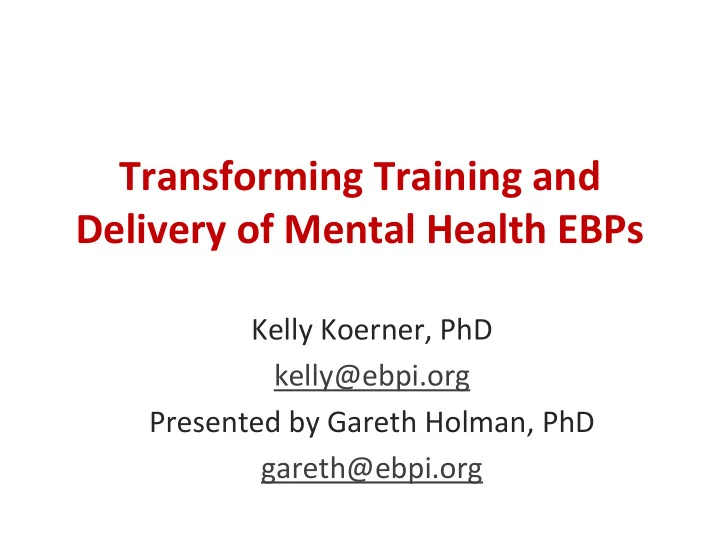

Transforming Training and Delivery of Mental Health EBPs Kelly Koerner, PhD kelly@ebpi.org Presented by Gareth Holman, PhD gareth@ebpi.org
What is the big goal?
The Problem: workflow prevents learning & using EBPs Window opens to learn, reflect… Window opens to learn, reflect…
What if a therapist’s life was easier…? Life becomes easier with EBPs … • open your laptop • see your day’s clients • at a glance, remember, see status, plan today’s work. • See problems, easily reach for help • Tools, education, peers and you feel justifiably confident you give the best possible care .
What if a client’s progress wasn’t constrained by therapist’s workflow? you could get EBPs … • as self-help (cCBT) • as computer-assisted therapy • at a glance, remember homework, see progress. and you feel justifiably confident you get the best possible care .
Betting the Farm on 3 Ideas
scalability (modular + technology + community)
train clinical expertise
BIG data
scalability (modular + technology + community)
PracticeGround’s Starter Modules Progress Monitoring Behavior Activation Modular Therapeutic Relationship Approach Values Defusion Validation, especially emotion-focused work
Specify how skill difficulty and cost of training method relate to client outcome
Then tailor: for employment counselors for psychiatry residents BA + cultural competency (and so on) Kanter Puspitasari Martell insert Sudak target audience here
nurture ongoing learning communities
BE generous
scalability modular competencies technology-based training communities of practice
train clinical expertise the amateur plateau deliberate practice + feedback
After a few months to a year, amateurs stop improving The Amateur Plateau Why? The good-enough level The curse of automaticity
Experts keep improving for ~10 years—WHY? • Deliberate Practice 140 – Identify a specific target 120 100 of achievement 80 – Break it into pieces 60 40 – Repetition of each piece 20 with a focus on mastery 0 0 2 6 2 years • Informative Feedback months months months – Immediate indication of whether performance is effective or ineffective K. Anders Ericsson, The Road to Excellence
How can you scale what’s actually needed for clinical expertise?
Step-wise research plan 1. Establish naturalistic baseline of minimal intervention/TAU 2. Beef-up key components – strengthen experimental design – assessment of skill acquisition/fidelity – training support – establish feedback mechanisms 3. Etc…
1.You can teach therapists to regularly monitor progress with online tools in 4 sessions 100 1. How to use OPT 90 2. Inviting client to 80 % clients in caseload use OPT 70 3. Handling 60 noncompliance 50 * DASS 40 4. Using data to * idiographic 30 guide decision- 20 making other standarized 10 5. Handling lack of 0 progress Post Pre Tool +
but use 6 and 12 mo follow up to understand minimal intervention % clients in caseload
2. Improve experimental design: Training to improve therapy relationships. 1. Self assessment of FAPIS scores for both groups across time. 280 interpersonal skills 275 and vulnerabilities. 270 2. Functional case 265 conceptualization FAPIS Scores 260 3. Intersection Group 1 between the two 255 Group 2 4. Deliberate practice 250 asking hard 245 questions, 240 appreciating, giving feedback, etc. 235 Time 1 Time 2 Time 3
3. Flip the course, with baked in assessment of fidelity Behavioral Skills Training Model: Self-paced, online, reading 1. Instruction Self-paced online videos, live demos 2. Modeling 3. Practice Train skill-by-skill online 4. Feedback Session 2 Skill Skill Skill Skill Session 1 Session 3 Session 4 Pre Post Practice Practice Practice 1 2 3 4 Measure competency in each skill via structured role plays
4. Feedback in routine workflow 26
train clinical expertise the amateur plateau deliberate practice + feedback
BIG data
Chris Lintott What to Do With 500,000 Scientists “Citizen” Science over a pint in an Oxford pub • ½ million volunteers sorting galaxies • 250 million classifications
Kelly Koerner, PhD kelly@ebpi.org Gareth Holman, PhD gareth@ebpi.org www.practiceground.org THANK YOU
Recommend
More recommend